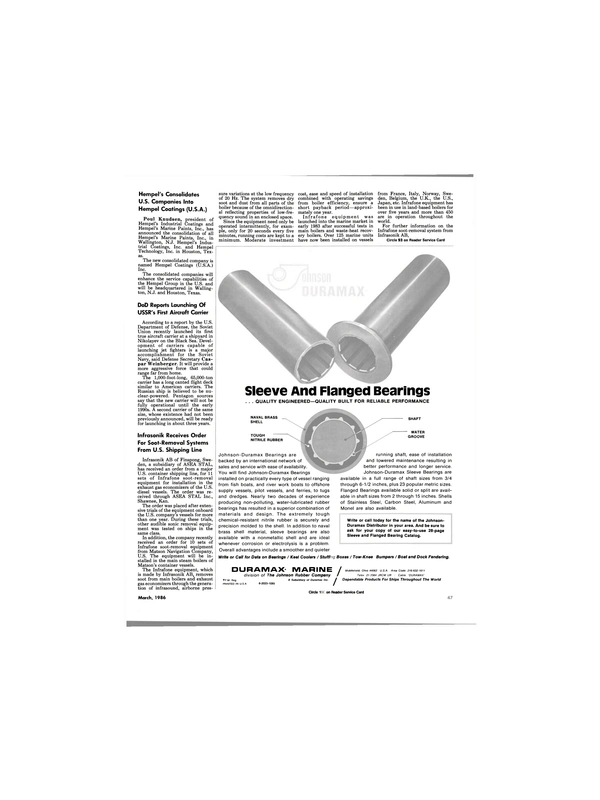
Japan Radio Offers New Literature On Products— GSC-80 ODARS And JLR-4000 GPS Navigator
Japan Radio Company, Ltd.
(JRC) recently introduced two new products—the JLR-4000 Global Positioning System (GPS) Navigator and the GSC-80 On-Board Data Aut o m a t i c Recording System (ODARS).
The GPS NAVSTAR system with timing and ranging is a completely new system that will eventually use 18 satellites to pinpoint a ship's position and speed anywhere in the world with great accuracy. The system can now use seven satellites now in orbit, allowing measurement of positions for about three to five hours a day. Twenty-four-hour service will be available in about 1987.
The JLR-4000 navigator is said to be one of the most compact and lightweight units in the world, with a unique time-sharing feature. As the GPS navigator receives signals from four satellites to measure a position, four or five receiving channels would normally be required.
However, the time-sharing system developed by JRC permits the receiver to receive the signals from all four satellites on a single channel for instant position fixing. The GPS receiver determines not only latitude, longitude, speed, and bearing— the basic functions—but it can also indicate such navigational data in memory as destination, bearing and distance to destination, required time to it, off-course alarm, etc.
Many optional units, such as a color plotter for color track display, a hard-copy printer for printouts of various data, and a remote display unit for displaying navigational data in a second location can be connected to the GPS navigator.
The GSC-80 ODARS has been developed to meet demands for automated data communications through the INMARSAT from ship to shore. It is an automatic data reporting system to collect various types of onboard information and to automatically transmit the newest data to the shipowner's office ashore via the INMARSAT telex link.
The system consists of a multidata interface and a telex channel interface that are connected to an existing or new INMARSAT ship earth station. The GSC-80 can transmit data to shore using three modes—fully automatic, semiautomatic, and manual. The onboard data received at the shore office is analyzed and processed to send a relevant sailing plan back to the ship.
For free literature describing both new products, Circle 75 on Reader Service Card
Read Japan Radio Offers New Literature On Products— GSC-80 ODARS And JLR-4000 GPS Navigator in Pdf, Flash or Html5 edition of March 1986 Maritime Reporter
Other stories from March 1986 issue
Content
- BUILD AND CHARTER' —A VITAL STEP IN THE RIGHT DIRECTION page: 6
- Navy Adding 13 Ships Costing $206.7 Million To Ready Reserve Force —Four To Be Converted page: 7
- Lips Designs Detachable Blade Propellers For Amoco page: 7
- Gary Carlson Joins Midland-Ross Corp. As Group Executive VP page: 8
- WATERCOM Telecommunications System To Be Fully Operational This Year page: 8
- $31-Million Development Project Begins At Port Of Miami page: 9
- B&B Dredging Offers Color Brochure On New Dredge Design page: 10
- Moss Point Marine Converts Tanker Into Oceangoing Grain Barge page: 10
- Grow Group Announces Merger Of Devoe Prufcoat And Napko Corporation page: 10
- Todd's San Pedro Yard Launches Guided Missile Frigate 'Davis' page: 11
- LATEST CHANGES IN U.S. NAVY SHIPBUILDING PROGRAM page: 12
- NEW NAVY BUDGET: OVER $100 BILLION page: 22
- NAVY CONTRACTS page: 30
- USCG Awards Aquafacs Inspection, Maintenance And Repair Contract page: 33
- Teleflex RMVAs Eliminate Corrosion, Misalignment And Binding Problems page: 33
- Marine Corps League's 6th Annual Exhibition Set For July 22-24 In D.C. page: 36
- 1986 VALVE EQUIPMENT GUIDE page: 38
- Fincantieri Awarded Orders For Seven Ships page: 45
- Japan Radio Offers New Literature On Products— GSC-80 ODARS And JLR-4000 GPS Navigator page: 45
- Bonner Elected Chairman, Solley Vice Chairman Of VMA page: 46
- Infrasonik Receives Order For Soot-Removal Systems From U.S. Shipping Line page: 47
- AWO: PROMOTING, PROTECTING AND DEFENDING THE BARGE AND TOWING INDUSTRY page: 48
- INTERCEPTING AND INFLUENCING THE REGULATORY PROCESS page: 49
- THE BARGE AND TOWING INDUSTRY: A LEGISLATIVE REVIEW page: 50
- THE INVISIBLE INDUSTRY page: 52
- R.J. Paine Named Marine Marketing Manager At Penske page: 54
- Intertrade Given Additional Navy Contract For Marine Fenders page: 54
- Stellar Technology's Battleship Spare Parts Depot Locates In Camden page: 55
- Coastal Corporation Purchase Of Texaco Terminal And Pipeline Interest Expands Market For Belcher Oil page: 56
- Big Heavy-Lift Cargo Carrier Delivered By Hitachi Zosen page: 56
- Free 28-Page Color Catalog On Bearings Offered By Duramax page: 58
- Kockums To Retrofit Swedish Sub With Air-Independent Stirling Engine page: 59
- Curtis Bay Towing Elects Swensen VP And General Manager page: 59
- Hempel Group Founder Dies At Age Of 91 page: 60
- Duff And Butera Hired At CDI Marine Company page: 60
- Record Well Depth For Floating Drilling Rig Set By ODECO's 'Ocean Rover' page: 61
- Michell Bearings Appoints Peter Pagan President page: 61
- TDI Introduces New Infrared Thermometer Kit page: 61
- MarineSafety Initiates Tug-Barge Simulator Training Course page: 62
- Alden Introduces Series Of Marinefax Recorders page: 62
- New Aeroquip Bulletin Explains Hose Assembly Machine Advantages page: 64
- Wtirtsilti Delivers Advanced Icebreaker To Finnish Board Of Navigation page: 64
- Congressional Conferees Agree To Appropriate $228.4 Million For Strategic Sealift Program page: 65
- SNAME Chesapeake Section Meeting Hears Paper On SWATH Survey Ship page: 65
- Garrett Division To Participate In Design Of New Engine For Mid-Sized Navy Ships page: 68
- Lindenau Installs Firefighting System On Offshore Supply Boat page: 69
- Schaffran Offers Free Literature On Propellers And Shaft Liners page: 69
- Marco-Seattle Awarded Cargo Ship Conversion page: 70
- Ellicott Machine Forms New Engineering Company —Morse Named Manager page: 70
- Wartsila Delivers Passenger/Vehicle Ferry To EFFOA-Finland Steamship page: 75


